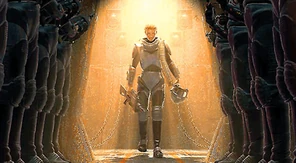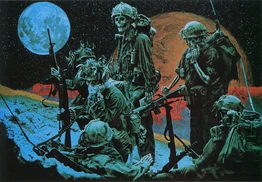It is rarely stated just how close to disaster House Crux was before the rest of the Empire joined in fighting the Imperial House of Cygnus. These desperate circumstances led to initiatives like the Headhunters of the Inhuman, the conscripted mobs of serfs sent to track down the synthetic menace. There was the risk of losing entire generations to the war effort, putting too-young noble scions on the battlefield. How dire Crux’s straits were exactly tends to be obscured by infosec, needful morale boosting, historical revisionism, and general propaganda. The post-war instability, the Fall of House Vela and the Corporate Uprising barely more than a year after the Betrayer’s execution, only compounded the misinformation and secrecy. First hand accounts and field reports tend to be deliberately contradictory while Synths still remain at large, and the uneasy shadow of renewed civil war still looms on the sector’s horizon.
Creation[]
During the most desperate period, an answer to the House’s shortfall of human power was the Basura Levies. The idea of penitent regiments and emergency conscripts was nothing new, as noted above with the Headhunters, but no one had yet made as vast an attempt. Erzherzogox Crux Baszrathael Hierex Bachhanard used their personal and professional connections to start a grand scheme, compelling armed service from even the most minor of infractions. With many Crucian nobles now dead or missing, the Erzherzogox pushed for the creation of duty-bonds. The House would issue a promissory writ, purchasing the labour of any serf whose liege could not be accounted for. There were vague promises of promotion, privilege, and special status for those who would serve in these support levies, assuming one lived long enough to collect them.

As an Ex-Justicar and a current Kommerzialrat supplying large portions of the House’s in-system matériel, Erzherzogox Bachhanard had plenty of influence to push their ideas through the wheels of war-time bureaucracy. Publicly, they referred to the conscripts as the Bastion Levies, and used them to shore up any and all gaps in human-power that arose. Privately, the Erzherzogox called them Baszrathael’s Levies, from which the somewhat insulting shorthand ‘Basura’ evolved. The Basura scheme was a series of smaller simultaneous recruitment projects scattered throughout the many arms of the House. The projects would even pull in ‘volunteers’ from third-parties like corporations stranded in the Ellis System. Their service contracts were bought-out by the Baszrathael family's personal wealth or labour rented under a blanket I.O.U. with no to-be-paid-by date.
The War[]
Signing up for the emergency levies became attractive for many reasons. Enlistees were showered with glory and propaganda for their great service. Rationing became tight on the planet and joining meant better portions. There was also a question of general survivability for civilians at large as the war heated up. Better, some thought, to die well fed and with a gun in hand than huddled in a city-bunker waiting for the next gene-bomb to be dropped. As the enlistment numbers swelled, so too did their mortality rate. Under-trained and often ill-equipped, these commoner levies would be thrown wherever the fighting was thickest. Any unit in need of immediate reinforcement or missions where the risk was highest would see a Basura levy flown in. Lavished with praise, public respect, and a romanticism for their sacrifice, they were still just used as all-purpose fodder.
The Aftermath[]

When the rest of the Empire joined the anti-Cygnus effort, the call came for fewer and fewer of these pedestrian combatants. Each House had their own resources, and often filled mission roles better. The Basura Levies were shifted to where they could not get in the way; ancillary stations in remote locales with little consequence. They would spend the rest of the war ignored, except when expendable troops were needed to pad out flanks and vanguards. Little celebrated and less remembered, eventually the end of the war came with the death of the False Emperox.
Convenient to the Erzherzogox, few Basura Levies survived to try and claim their long-promised rewards. Almost nothing was actually paid out to the commoner-conscripts due to the clever wording in their terms-of-service. It became even easier when many of the owed freepeople could be linked with the corporations that revolted in the STO conflict. A handful of ‘heroes’ were selected for public exemplifying. They were quietly decorated and given a year of cushy service on one of the sector’s more temperate worlds. After that year, they joined the rest of their surviving levy-cohorts in merrex postings. (Merrex assignments are considered any sepulchral-service in a ‘kingdom by the sea,’ a confused reference to an ancient Terran poem.) The reward was a quiet quasi-retirement attached to a remote garrison either on the sector fringe or at the furthest outer reaches of a star system. The levies were broken up and spread far apart. Merrex postings meant inspecting Oort miners, guarding Kuiper prospectors, and generally waiting to die of boredom and old age. Aubengarten lodges tend to be rather popular with noble officers serving with the regulators, rangers, and irregulars exiled to the sector’s outer darkness; a silent grudge simmering at the edges of starlight.
| Crucian Civil War | |
| Hiera | |
| Locations-Hiera | |
| Life | |
| Titles | |
| Organizations | |
| Law | |
| Synths |
|
| People | |
| Gleipnir | |
| Miscellanea | |